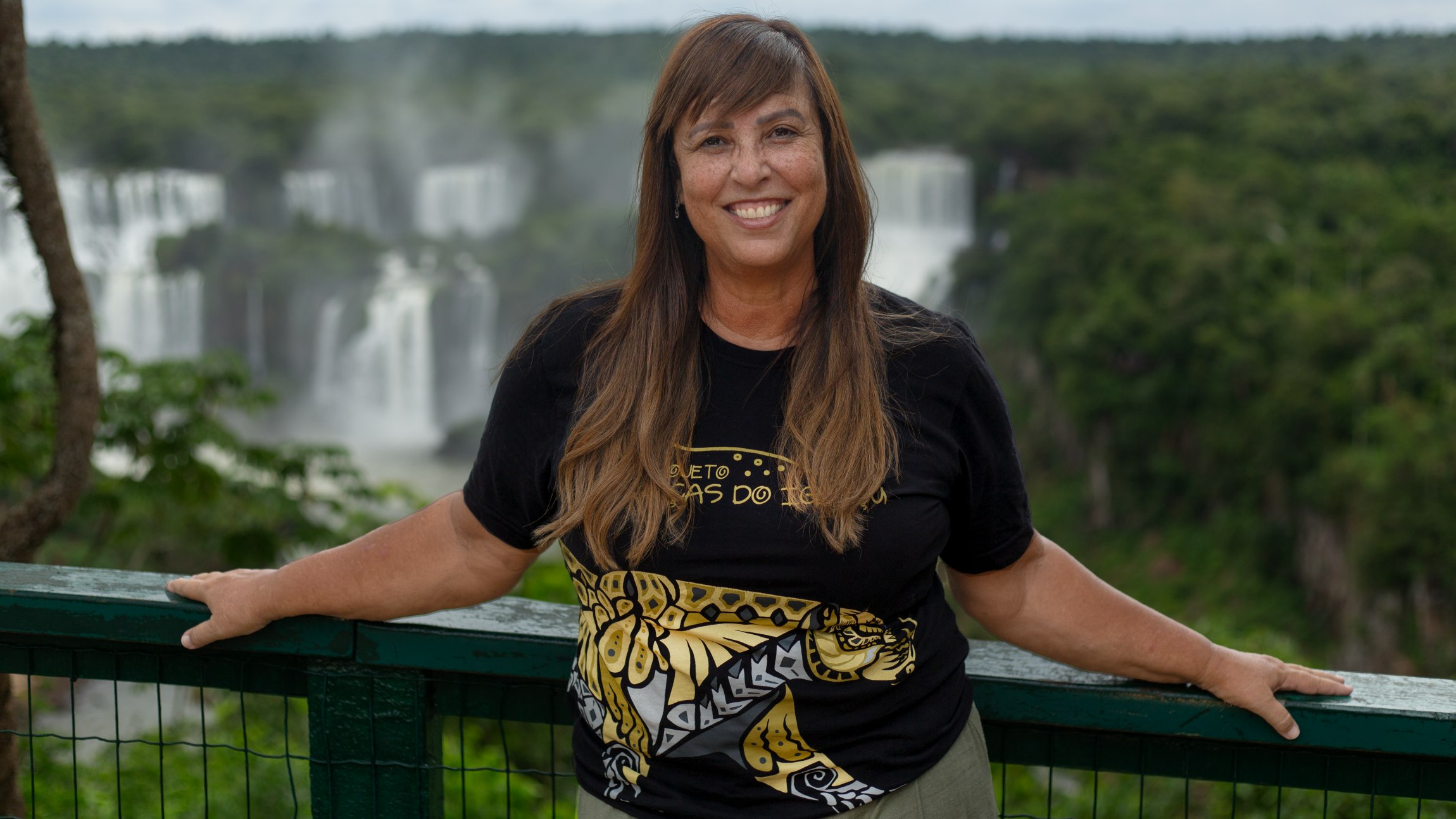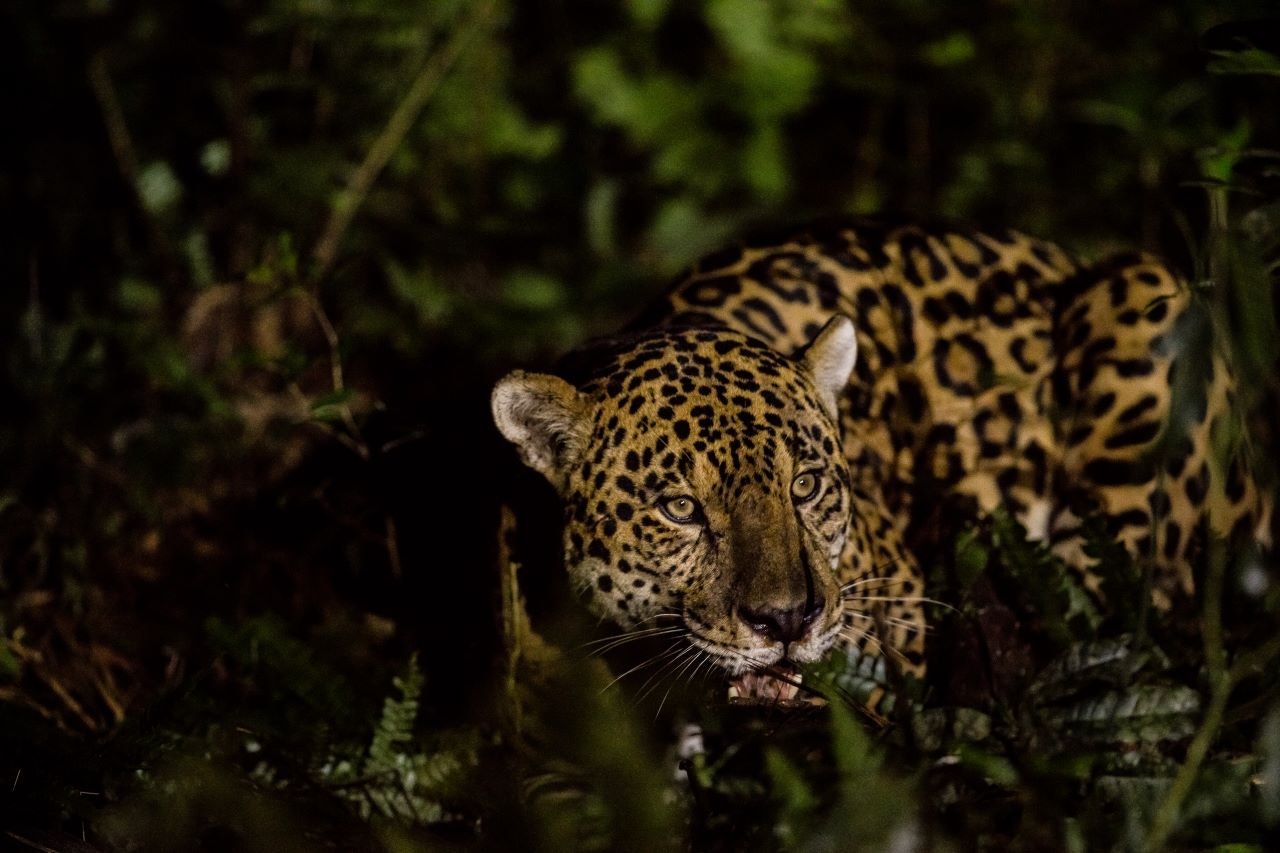
UK charity, the Whitley Fund for Nature (WFN), has recognised Brazil’s Dr Yara Barros with a 2025 Whitley Award for her work to protect jaguars in Iguaçu National Park in the Atlantic Forest, where populations are growing and her team is teaching local communities how to co-exist with the apex predator.
Charity Patron, HRH The Princess Royal, presented the £50,000 Whitley Award on 30 April at the Royal Geographical Society. The event was livestreamed to YouTube.

“One of our goals is to transform fear into fascination, and we actively work towards coexistence between jaguars and humans.”
Executive Coordinator of the Project Jaguars of Iguaçu, Yara’s team has played an important role in doubling jaguar numbers in the Green Corridor, which comprises Brazil’s Iguaçu and the Argentina side of the UNESCO World Heritage Site. Jaguar numbers in the biodiversity hotspot, the site of one of the world’s most famous waterfalls, rose to 25 from just 11 within the park and to 93 from 40 within the Green Corridor over 13 years.
With a bite more powerful than lions or tigers, jaguars have traditionally been feared by local people and have no predators. Hunting is their number one threat, both in retaliation for attacking livestock as well as incidental hunting by those targeting prey. Habitat loss means the largest feline in the Americas now occupies less than half of its historical range. In the highly deforested state of Paraná where Yara works, local jaguar numbers plunged by 72 percent in the 1990s.
Strengthening the connection between local communities and the park was urgent to mobilize support for the jaguar’s survival. Since her appointment to the role in 2018, the zoologist and her team have worked to shift the narrative so that local people view jaguars as vital to biodiversity. Instead of killing jaguars, landowners now contact Yara’s team first to resolve conflicts. They have since addressed 137 predation events and conducted almost 2,000 visits to properties.
With Whitley Award funding, Yara’s team aims to ensure the local Critically Endangered jaguar population will continue to grow. Their strategy includes improving livestock management, installing anti-predation devices to reduce livestock losses, and engaging environmental stakeholders in Brazil, Argentina and Paraguay to respond effectively to big cat incidents.
The anti-predation Foxlights are solar-powered devices designed to protect livestock by simulating human activity. They emit randomized flashes of light in different intensities and directions throughout the night, creating the illusion of movement.
The jaguar is considered a ”landscape detective species” because it helps determine how to manage landscapes; more data will benefit species including the cougar, the margay, the ocelot, the jaguarundi and the southern tiger cat.
Yara’s team will forge deeper ties with the local resident population of 500,000 in the ten cities surrounding the park. They will expand existing partnerships with local communities and schools where initiatives include boosting awareness with school children and a project to empower women through the “Jaguar Crocheteers” programme. They also persuaded the airport at Foz do Iguaçu, the gateway city to the park, to become the first in Brazil to be “Jaguar Friendly,” which includes supporting research on jaguars, creating spaces within the airport for visual and educational communications on jaguars, and implementing safety measures to prevent large felines from entering the airport premises.

“In the face of climate change and rapid biodiversity loss, jaguar conservation is a strategic step toward ensuring ecosystem resilience and human wellbeing.”
Cross-border collaboration with peers in Argentina will play a vital role. Combined, the two parks represent one of the most important biological continuum in South America. Iguaçu National Park spans 185,262 hectares of preserved area and is run by the federal government. The Green Corridor is home to one-third of the biome’s jaguars as well as species including cougars and the broad-snouted caiman, 390 species of birds and 750 species of butterflies. The park attracts two million tourists a year.
Yara says she turned to jaguars after a long career protecting birds which included working with the last wild individual of the Spix’s Macaw. After her first face to face encounter with a jaguar, she decided to “do the impossible to ensure those golden eyes kept shining in the forest.”
Jaguars have lost some 60 percent of their habitat with the largest jaguar stronghold in the Brazilian Amazon where it is categorised as Near Threatened by the International Union for the Conservation of Nature. All other sub populations have been categorised as Endangered or Critically Endangered. Large-scale threats include man-made fires, deforestation, illegal killing and trade.
Yara previously served as technical director of Parque das Aves, a Brazilian zoo focused on bird conservation. Other roles included President of the Brazilian Association of Zoos and Aquariums and roles at Brazilian government agencies IBAMA, the federal agency responsible for environmental protection, and ICMBio, which is part of the Ministry of Environment.
HIGH-RES IMAGES AVAILABLE HERE
PRESS RELEASE PDF AVAILABLE HERE
NOTES TO EDITORS – WHITLEY FUND FOR NATURE
The Whitley Fund for Nature (WFN) is a UK charity supporting grassroots conservation leaders in the Global South. Since its creation in 1993, it has channelled £24 million to 220 conservationists across 80 countries.
An early pioneer in the sector WFN was one of the first charities to channel funding directly to projects led by in-country nationals. Its rigorous application process identifies inspiring individuals who combine the latest science with community-based action.
WFN’s flagship prizes – Whitley Awards – are presented by charity Patron, HRH The Princess Royal, at a prestigious annual ceremony in London at the Royal Geographical Society (RGS). Winners receive funding, training, and profile boost, including short films.
The 2025 Whitley Awards Ceremony took place on Wednesday 30th April at the RGS and streamed live on YouTube from 7:30pm BST. The 2025 Whitley Award winners are:
- Reshu Bashyal from Nepal who is addressing widespread poaching of orchids and yews, driven by international demand for their medicinal and ornamental value.
- Dr Federico Kacoliris from Argentina who is expanding protection for the country’s most threatened amphibian, the El Rincón stream frog, and its river habitat in the volcanic Somuncura Plateau.
- Dr Andrés Link from Colombia who is protecting brown spider monkeys in the lowland rainforests of central Colombia and reconnecting the species’ fragmented habitat through a network of private protected areas.
- Rahayu Oktaviani from Indonesia who is ensuring continuous canopy for the Endangered Javan gibbon on Java, one of the most densely populated islands on earth.
- Dr Farina Othman from Malaysia who is saving the last 300 Bornean elephants in the east coast of Sabah State in Malaysia’s Borneo by working with large and small palm oil stakeholders.
- Every year, a past Whitley Award winner is chosen to receive the Whitley Gold Award, worth £100,000, in recognition of their outstanding contribution to conservation. Joining the Judging Panel, the Whitley Gold Award recipient also acts as a mentor to Whitley Award winners and an international ambassador for conservation success. The 2025 Whitley Gold Award winner is Rwanda’s Dr Olivier Nsengimana, recognised for his leadership in rebuilding the Grey Crowned Crane in Rwanda and for an ambitious plan to secure protection across East Africa for the iconic bird and its wetland habitat.
- www.whitleyaward.org, Facebook, Twitter, Instagram, YouTube, LinkedIn
FOR INTERVIEW REQUESTS AND INFORMATION, CONTACT:
Carol Roussel, Head of Media Relations, Whitley Fund for Nature,
T: 07379 019 804
Josephine Higgins, Head of Communications, Whitley Fund for Nature,


